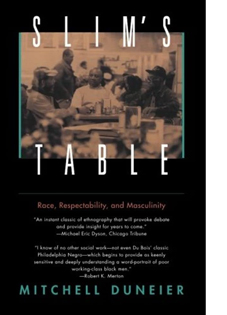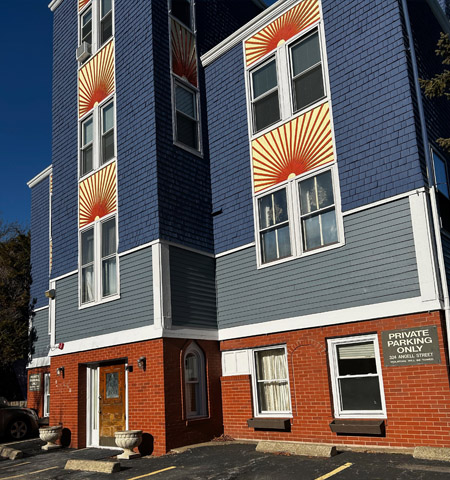
Slim’s Table: Race, Respectability, and Masculinity
by Mitchell Duneier (photographs by Ovie Carter)
The University of Chicago Press, 192 pp.

A stone’s throw away from Chicago’s Catholic Theological Union, which as of yesterday boasts Pope Leo XIV as its most famous alumnus, the Valois Cafeteria whips up breakfast and lunch fare right in front of its customers. It’s what’s given the Greek-owned Hyde Park cornerstone its nickname of “See Your Food.” It’s pronounced “Va-LOYZ,” with an unpretentious candor befitting its array of pancakes, sandwiches, and hashes.
The name throws longtime radio host Studs Terkel for a loop – how he pronounces the name of his guest, Mitchell Duneier, threw me for two. “Dune-YAY.” The French way. More dignified when said aloud than its crude pronunciation guide would tell you.
At the time of this 1992 radio show, Duneier is a meek early-thirty-something doctorate in sociology at UChicago. It’ll be some time before Valois regular Barack Obama brings the eatery to national consciousness, so here and now Duneier and his panel are carrying most of Valois’ water. He’s talking about new book Slim’s Table: Race, Respectability, and Masculinity, including photos by Ovie Carter. The title “Slim,” Nate Douglas, is a Black lower-working class mechanic in an unassuming South Side auto garage, and today he has the privilege of sitting alongside Duneier, Terkel, and Carter for one of the 20th century’s most esteemed radio broadcasts.
Brought to the Gallery's bookshelves by exhibiting artist Ian Cozzens (who gladly allows you to sit on the stool at his installation's desk), Slim’s Table is an ethnography from over three decades ago that quietly yet firmly rejects today’s mass-marketed lies about masculinity. Four years of sitting and joining in on cafeteria chats coalesce into a document of an older generation of Black working-class men whom sociological studies still gloss over.
Duneier makes no claims that his research accounts for the entirety of the population. Most chapters are written at what seems like an emotional remove from the rest of the group; Duneier’s not doing much besides listening in. Other people’s talk, doting and decorous, adhered to a mutually agreed upon set of moral codes, and occupies more of the page than his theories melded around them. Tracking their conversations, I got the sense that their reserve was rubbing off on Duneier – he was being conditioned by their presence, not the other way around.
“Young black cats…they’ve had it on a silver platter,” complains a sanitation worker at the cafeteria, when the noise streaming from a boombox interrupts a White Sox radio broadcast. “They walk into the place and they want to own it right now.” Claude, a cop, agrees with the sentiment. Different regulars enter in to say their piece, priding themselves on their lifelong work, disdaining the younger generation and the middle classes for what they agree upon as wastefulness.
Because at and around Slim’s table, being a man is doing the best job you can, sucking it up without ceding your vulnerability. Role models aren’t defined by what they did, but how they did it. They’re not the people who left the slums for higher-paying jobs as doctors or lawyers, nor did they break home run records or top the charts. You shine someone’s shoe to its brightest (as Duneier’s favorite photo in the book depicts), you’re setting an example to your peers.
Duneier finally raises his voice in the book’s final chapters, which take aim at the sociological institutions preening themselves with innocence – what Shelby Steele writes is a byword for power. Why are even the most considerate liberal writers lamenting the Black ghettos as the only loci of moral destitution, Duneier asks? Chinese-Americans have moved up the ladder! Irish, too! Yet the same lamenting concern isn’t reserved for the people left behind there.
Contrasted with the skittish sense of guilt that plagues the more modern ethnographies I’ve read, Slim’s Table is comfortable in its own skin. While Duneier starts off his study as ignorant as anyone else, the insights he gains into Valois’ social dynamics are developed into a self-assured confrontation of academia’s pigeon-holing of older Black men into convenient but blatantly misguided assumptions. Plus Valois “See Your Food” Cafeteria is up and running, 7 days a week, 6 AM to 3 PM. It recently turned 100, enduring through the pandemic! And now it’s a greasy, intimate pit stop for a future religious pilgrimage.
